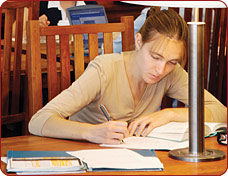Planning for Academic Success
If you’re like many UW–Madison parents, the time since you dropped your student off at his or her residence hall in August feels like it has gone by in the blink of an eye.
It’s a safe bet that the next three months will go by even more quickly.

The best way to support your student’s academic success is by listening, encouraging, and coaching. Photo: Michael Forster Rothbart
With spring break, summer vacation, and sophomore year just over the horizon, your student will very quickly be faced with a whole new set of transitions and challenges. Among them: choosing a major, fall advising and registration, and, for those who did not perform well academically during first semester, making the necessary adjustments to be successful this spring.
“Continue to witness and accept the evolution of your child into an adult,” says Wren Singer, director of the Office of New Student Programs. “I think students mature quite a bit during the second semester of freshman year. Continue the good parenting techniques learned in the first semester: listening, encouraging, reflecting, coaching.”
At this point in the semester, two important topics are on the minds of students
and parents: selecting a major and planning ahead for next fall.
A major needs to be declared officially at some point, however for most freshmen,
that point isn’t quite yet, Singer says.
Only a few UW–Madison majors require a student to declare during freshman year in order to finish in four years. Generally, these are education, engineering, and music majors. Students interested in biology, business, the pre-med curriculum, and the physical sciences would do well to get started as early as possible. Many students can wait until their junior year to officially declare a major.
What’s most important during this time period is for parents to encourage students to self-explore, which will help them focus on the direction that they are headed, Singer adds.
“I think the best questions parents can ask are: What classes do you like? What are you good at? What out-of-class learning experiences might give you clues into an interesting major?”
The choice of a major doesn’t set or lock a student into a permanent decision
or a specific career path. Many college students change their minds and their
majors at least once. Don’t feel discouraged or frustrated if your student
is undecided or decides to change course. An academic advisor can provide detailed
information on how choices about a major might influence graduation dates,
says Timothy Walsh, director of the Cross-College
Advising Service (CCAS).
A wealth of useful information, including webcasts and a schedule of upcoming academic and career exploration workshops are posted on the CCAS Web site.
Similarly, advising and registration for the upcoming summer and fall terms will be coming up quickly.
Registration dates and times are determined based on the number of credits a student has completed. Continuing students generally register beginning in April. Students will receive an e-mail from the registrar notifying them of their assigned registration date and time. At that time, registration details will also appear in their “My UW.”
Parents can support their students by encouraging them to connect with an academic advisor to discuss course selection. Even though some students are not required to see an advisor in order to register, it is always recommended that they do consult with advisors, either through group advising sessions or meeting one-on-one, when making course decisions.
As in everything, planning ahead and making an early appointment is better
than waiting until the last minute. As a reminder, parents are discouraged
from contacting advisors and actively selecting courses for their students.
If your student struggled first semester and is continuing to struggle, Singer
encourages him or her to complete the spring semester and make a reassessment.
“Students are continuing to learn study skills and plug themselves into campus resources,” she adds. “A lot can change during the spring.”
House fellows, in-hall tutors, study groups, and tutoring services such as the Greater University Tutorial Services (GUTS) are all excellent resources that are easy to access. Also, encourage your student to get to know his or her teaching assistants and professors and take advantage of office hours.
“There is absolutely no shame in asking for help,” Singer says. “All college students are challenged by something.”
As part of encouraging discussion and asking good questions, parents may also want to talk with their student about plans for after the end of the semester, says Carolyn Bell, student services coordinator in University Housing.
“It’s never too early to start discussing summer plans, internships, interest in living in Madison for the summer and taking classes, living at home and taking classes, as well as summer jobs,” she says.
Lastly, encourage your student to experience more of life at the university than just the inside of his or her room. If he or she hasn’t yet explored the city, developed a new passion or interest, or gotten to know students who are different from himself or herself, encourage your student to put some effort into doing so.
“Looking back on your own younger years, who doesn’t wish that they learned
how to sail, worked on behalf of a cause, or joined an Ultimate Frisbee team?”
says Dean of Students Lori Berquam. “I want all students to explore their passion
and make the most out of their Wisconsin Experience.”
